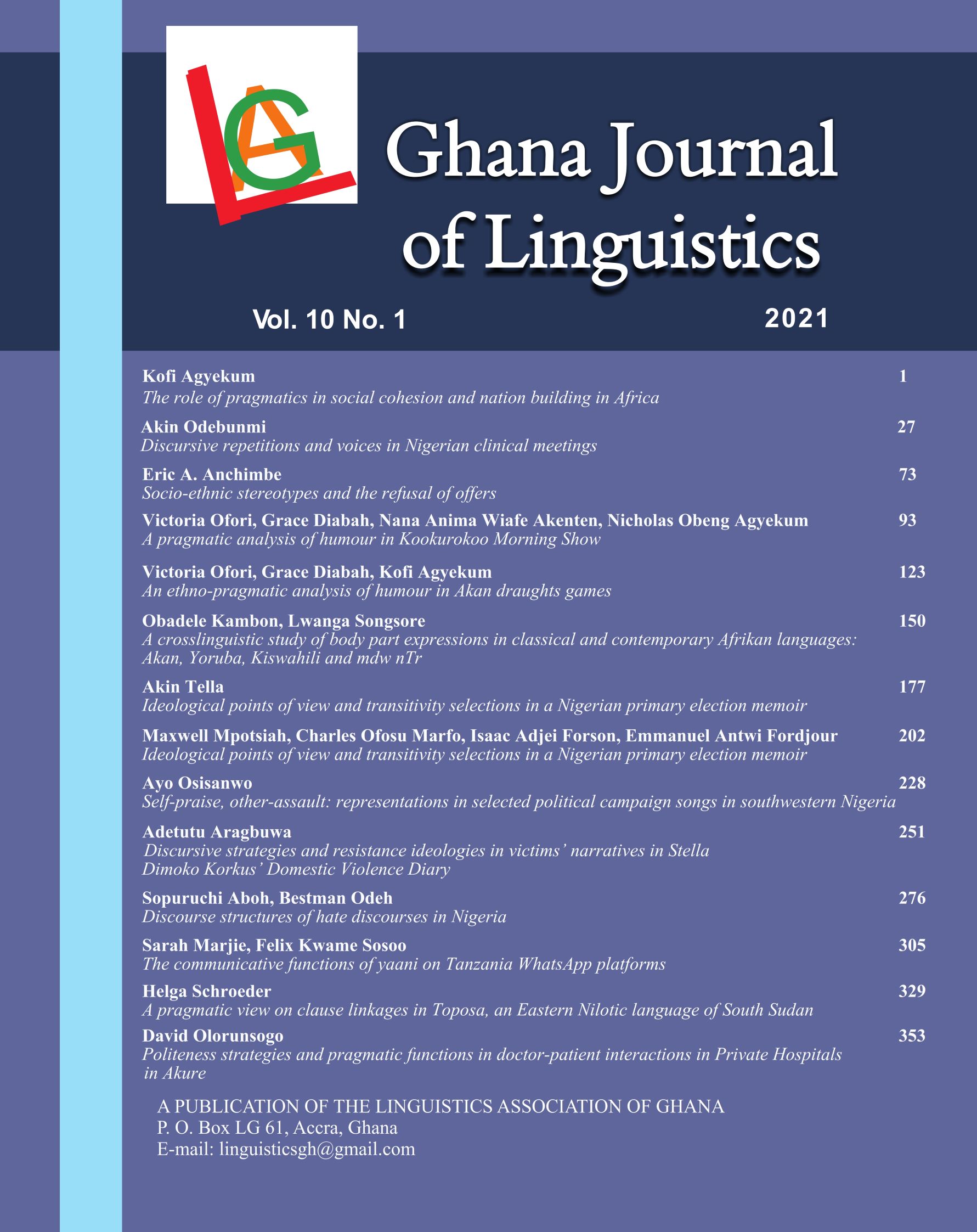A discourse pragma-stylistic analysis of invective expressions in Ghanaian politics
DOI:
https://doi.org/10.4314/gjl.v10i1.335Keywords:
discourse, pragma-stylistic, invectives, Ghanaian politicsAbstract
Decent use of language has been a common trademark in communication. It is such an aspect of human development that has been an important part in our societies since time immemorial. In recent times, this practice has contemptuously gone amiss due to our demanding need for democratic development. Recent development in politics in Ghana has witnessed a total change in the use of decent language to achieve the intended purposes in political communication. It is in this regard that the present study sought to examine the use of invectives in political communications in Ghana. The study adopted Fairclough’s (1995) Critical Discourse Analysis theory to analyse the data gathered, which spanned from 2011 to 2016 and were taken from statements made by politicians that had been covered as major news items in the print media and online networks. In all, one hundred and fifty (150) bulletins of such invectives were identified and further categorised into descriptive, attributive and symbolic forms. Our findings showed that many of the noted politicians in Ghana made frequent use of invectives to seek political recognition that will prepare them for better political fortunes should the party they represent come to power in the future. It was further identified that all of these invectives were meant to cause emotional and psychological pains and also to lower the social status of the affected individuals so as to make them politically ‘dirty’ and irrelevant.
References
Abotsi, Kofi Ernest. 2013. “Re-thinking Winner-takes-all System”. Governance Newsletter 19 (4): 1-8.
Agu, Margaret Nonyerem.2015. “A Pragmatic Analysis of ‘Leadership’ Cartoons in Selected Nigerian Dailies”. Ansu Journal of Language and Literary Studies 1(2): 64-70.
Agyekum, Kofi.2004. “Invective Language in Contemporary Ghanaian Politics”. Journal of Language and Politics 3(2): 345-375.
Agyekum, Kofi.2002. “Menstruation as a verbal taboo among the Akan of Ghana”. Journal of Anthropological Research 58: 367-387.
Beard, Adrian. 2000. The Language of Politics. London: Routledge.
Bentil, Shadrack & Gilbert A. Aidoo. 2018. “The Negative Implications of Adversarialism and Politics of Insult in Ghana: An Overview”. Developing Country Studies 8(4): 7–13.
Boateng, Adam. 2018. Democracy and Politics of Insults in Ghana: The Media Factor. A Published Master’s Thesis, International Relation and African Studies. Istanbul Commerce University: Turkey.
Boufield, Derek. 2008. “Impoliteness in the Struggle for Power”. In Impoliteness in Language: Studies on its Interplay its Power in Theory and Practice, edited by D. Bousfield & M. A. Locher, 127-153. New York: Mouton de Gruyter.
Cook, Guy.1992. The Discourse of Advertising. London: Routledge
Dahal, Ranjan Kumar. 2000. “Language Politics in Nepal”. Contributions to Nepalese Studies 27(2): 155–190.
Dalton, Eric John. 2013. Impoliteness in Computer Mediated Communication. Unpublished M.A. Thesis. San Diego State University, USA.
Danso, Sarah O. and Fiifi Edu-Afful. 2012. “‘Fruitcake’, ‘Madmen’, ‘All-die-be-die’: Deconstructing Political Discourse and Rhetoric in Ghana”. In Managing Election-related Violence for Democratic Stability in Ghana, edited by K. Aning and K. Danso, 97-138. Berlin: Friedrich–Ebert–Stiftung.
Ezema, Pius Attah. 2009. “The English language, Politics and the issue of Multi-ethnicity in Nigeria”. Bassey Andah Journal 2: 115-123.
Fairclough, Norman. 1995. Media Discourse. London: Arnold.
Farb, Peter. 1973. Word play. London: Jonathan Cape.
Gyampo, Ransford Edward. 2015a. “Winner-takes-all politics in Ghana: The Case for Effective Council of State”. Journal of Politics and Governance 41(1): 17–24.
Gyampo, Ransford Edward. 2015b. Dealing with winner-takes-all politics in Ghana: The Case for National Development Planning. Governance 20(1): 1-10.
Huddleston, Rodney. 1988. English Grammar: An Outline. Cambridge: University of Cambridge Press.
Imoh, David. 2014. The Fanaticism of Nigerians in Politics. Opinion Nigeria. From http://www,opinionnigeria.com/the-fanaticism-of-nigerians-in-politics-by-imoh-david/#sthash.yAT6aP7Z.dpbs
Kodah, Mawuloe Koffi. 2012. “The Aesthetics of Invective: Reflections on the use of verbal violence in the ‘Suns of Independence’ of Ahmadou Kourouma”. Journal of Humanities and Social Science 3(5): 1-8.
Marfo, Samuel. 2014. “Thinking of Peace, Democracy and Politics of insults in Ghana. The Paradox of freedom and culture of violence”. Journal of African Affairs 3: 522-530.
Michira, James Nyachae. 2014. “The Language of Politics: A Critical Discourse Analysis of the 2013 Kenyan Presidential Campaign Discourse”. International Journal of Education and Research 2: 1-18.
Ofori, Emmanuel Amo. 2015. The use of insults in Ghanaian political discourse. A Critical Discourse Analysis. A published PhD Thesis, Department of Linguistics. University of Florida, USA.
Ofori, Emmanuel Amo. 2018. “Inter-party insults in political discourse in Ghana: A Critical Discourse Analysis”. In African Linguistic on the Prairie: Selected Papers from the 45th Annual Conference on African Linguistics, edited by J. Kandybowicz, T. Major, H. Torrence and P. T. Duncan, 21–35. Berlin: Language Science Press.
Okpewho, Isidore. 1992. Africa oral literature. Bloomington: Indiana University Press.
Richardson, John. 2007. Analyzing Newspapers: An approach from Critical Discourse Analysis. Houndmills: Palgrave.
Rozycka-Tran, Joanna; Boski, Pawel andWojciszke, Bogdan. 2015. “Belief in a Zero-Sum Game as a social axiom: A 37-Nation Study”. Journal of Cross-Cultural Psychology 46(4):525-548.
Sapir, Edward. 1963. The Status of Linguistics as a Science. In Selected Writings in Language, Culture and Personality, edited by E. Sapir and D. G. Mandelbaun, 160-176. Berkeley & Los Angeles: University of California Press.
Yiannis, Gabriel. 1998. “An Introduction to the Social Psychology of Insults in Organizations”. Human Relations 50: 1329-1354.
Yankah, Kwesi.1995. Speaking for the Chief: Okyeame and the Politics of Akan Royal Oratory. Bloomington: Indiana University Press.

Downloads
Published
How to Cite
Issue
Section
License
Copyright (c) 2021 Maxwell Mpotsiah, Isaac Adjei Forson, Emmanuel Antwi Fordjour, Charles Ofosu Marfo

This work is licensed under a Creative Commons Attribution 4.0 International License.
The Ghana Journal of Linguistics is published by the Linguistics Association of Ghana, P. O. Box LG 61, Legon, Accra, Ghana.
LAG Email: linguisticsgh@gmail.com. Website: http://www.laghana.org
GJL Email: gjl@laghana.org Website: http://www.laghana.org/gjl
© Linguistics Association of Ghana and individual authors, 2023.
